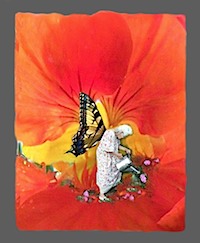"Benediction"
As it was in the beginning, is now, and ever shall be.
Because I'd once been told what women always had done - though never
how, or why - after you died, the last tube taken out and gone,
and they offered to leave us alone, I asked if I could wash you.
The soapy water was warm, as you were, still, and soft. The basin was round.
The towels and wash cloths thick and white. And there was no strangeness in it,
really. And I didn’t cry, and that, too, was part of the wonder.
I began with one smooth, pliant arm. As once you daily must have done with me,
as once you must have done at your own mother’s death, I carefully dipped one cloth,
and carefully wrung it, and carefully bathed the whole freckled length of your arm,
your docile hand, each finger light in its yielding.
And though you had no choice in acquiescing to my love, I did not
revel in my power, but slowly lifted, washed and patted dry each limb, in turn,
your crooked toes and in between the toes; your shoulders, breasts,
the secret folds between your legs, thin pubic hairs, and with a different cloth,
which would have been your way, your face.
I took my time. I lingered in this unexpected absence of condition or demand.
And when at last with nothing more to do, I sat beside your bed and took
the hand I’d long since lost the need to hold, and laid my grown-up hand inside:
Oh, familiar shape my fingers knew by heart and had forgotten
that they’d ever known. How long this total rightness had been gone.
And, as leisurely as once I must have done, when simple being was enough
to please you, I let my eyes, without distracion, wander every
tiny detail of your face, its astonishing calm. I saw again your chin,
unguarded; saw your knuckles worn, arthritic; sang a tune that came
from who knows where: This is the hand that fed me,
Hand that held me, Hand that punished me, Hand that led me.
For hours, sunlight was the only thing that moved. And soon
would be gone. And your hand in mine, still warm!
I stood to kiss your forehead. It was cold. But I had been
in the presence of holiness. World without end. And was done.
Copyright Ingrid Wendt, “Prairie Schooner,” Spring/Summer 2007
"Poem with Two Endings"
Say "death" and the whole room freezes - -
even the couches stop moving,
even the lamps.
Like a squirrel suddenly aware it is being looked at.
Say the word continuously,
and things begin to go forward.
Your life takes on
the jerky texture of an old film strip.
Continue saying it, hold it moment after moment inside the mouth,
it becomes another syllable.
A shopping mall swirls around the corpse of a beetle.
Death is voracious, it swallows all the living.
Life is voracious, it swallows all the dead.
Neither is ever satisfied, neither is ever filled,
each swallows and swallows the world.
The grip of life is as strong as the grip of death.
(but the vanquished, the vanquished beloved, o where?)
Copyright Jane Hirshfield
www.barclayagency/hirshfield.html
From "Your Questions"
I'll ask the next question for you
because you may not think to wonder,
"Is there anything you would have done differently?"
Yes, I'd bring his body home,
put his blue casket in my living room,
group all the flowers around him.
Imagine all the flowers.
Think of two more days
for me to look at my child,
discover the bruise
on his forehead that wasn't there
when we were playing.
I learned of his injury
weeks later
when the funeral director told me,
"He was so beautiful.
We did nothing but cover the blow."
For two more days
I could have spoken to my child face to face
before forced to speak
only to darkness or you.
There were not enough chances
to touch him,
put my cheek next to his.
I wouldn't have been afraid
of my child's body;
but I left him at the funeral home
in the corner room
on the second floor
and visited whenever I could
because I did not want to scare you.
Next time will be different.
I'll put my loved one in the house
like my mother's family used to do,
and we'll all gather around
like sitting by a fire.
At the cemetery, like a rabbi
I'll take the shovel
and heap the dirt back in the hole,
do the raking and sodding myself.
Let me tell you.
You would not know to ask ...
Excerpt of "Your Questions" from "The Andrew Poems"
Copyright 1994 by Shelly Wagner
Used with permission and available from
Texas Tech University Press 800.832.4042

